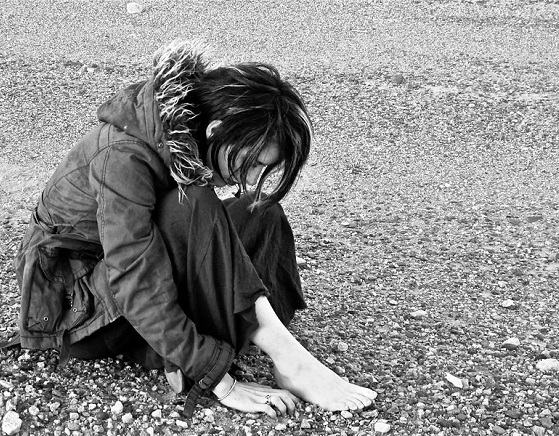Grief Demands That We Obey Love.

{source}
When we close down our hearts to grief, we disconnect from the truths that only live within the laws of love that long to pull us into greater alignment with aliveness and flourishing.
When we feed this chasm with our denial, fear or numbing out, we are abandoning ourselves and, ultimately, become the biggest betrayers of our own hearts.
Why are we so afraid of grief?
Our culture denies the reality of impermanence and death, the fluidity of what it is to be human — ever-changing and evolving. The spiral of life pulses us into creation and back down into dissolution and re-creation. Over and over again. The more fixed we are led to believe we are, the more difficult it is to surrender to the glorious liberation that grief affords us.
We are taught that pain is bad, so we have become illiterate in reading the signs of our pain and understanding what our pain or grief calls for. There are no initiation rites or ceremonies for grief outside of funerals or the loss of a loved one. Yet, we experience grief in so many other ways.
If we experienced emotional neglect or denial of our own reality, we can have a trauma response to our own emotions, including grief. We become afraid of it and run from what is actually trying to pull us in the direction we truly desire to go in.
Our mother wound often arises when we experience grief. Our inner mother is the innermost, unconscious attitude towards ourselves when we feel vulnerable, out of sorts, in pain or confused about circumstances we find ourselves in.
If we don’t know how to fully nurture and be kind to ourselves when we are grieving, our grief goes underground and easily becomes the fuel for the Death Mother, who is the darkest shadow of the archetypal Feminine, who oppresses the soul and keeps us stuck in pain, self-hatred, addiction, co-dependency and fear of our truth that will free us into creative living.
Suppressing our grief keeps us codependent, so patriarchal cultures also profit off our suppressed pain by selling us the fantasy that when things look a certain way, we have worked hard enough or mindsetted our way to a certain lifestyle, we will have arrived in some sense of freedom.
We give our power away to a fantasy of sometime in the future when things are finally good, or that person will get therapy, or stop that destructive habit, or we finally manifest that thing.
Grief can also bring up the unmetabolized pain of the past. So, when we lose something or experience grief, it can bring up other unresolved bits, which can make it feel overwhelming or confusing. It’s normal.
Our grief needs a witness. It needs to be acknowledged as real and worthy of love. Someone who can sit with us in it, help us make sense of it, and just be with us as we cry. Someone who is wise enough to know the difference, and is literate in the ways of the crossroads of change.
Grief pulls us into the here and now. What is working, what isn’t. What matters, what doesn’t. It demands change here, not in the future. If we are in denial of impermanence, this is scary.
Grief grants us the power to alchemize the walls of our hearts.
There’s nothing to be afraid of, but honoring grief and often the truths that arise with it requires us to change, to leave certain circumstances, grow up finally, or get our sh*t together and finally do the things we want to do.
There is fierce love that liberates us if we learn.
It’s simple, really, learning how to love ourselves in the depth of a collective, yet deeply intimate, human experience of grief. Our hearts open and we resurrect the sanity of love, no longer filling our lives up with distractions or tossing the refuse of our addictions onto the Mother’s body.
***
Dr. Mia Hetenyi is a psychospiritual healer, soul mentor and writer. She has carved out her own path based on 20+ years of clinical experience and an equal amount of time studying and practicing Buddhism, yoga, meditation, shamanic healing, ritual and energy healing. After recovering herself from addiction and experiencing an awakening to her soul, she fused her knowledge of psychology and trauma with both her studied and lived experience of shamanic and Buddhist healing modalities, creating an innovative approach to healing the soul wound at the root of so much addiction, shame and ongoing trauma. You can follow Dr. Hetenyi on Instagram and find out more about her work on her website.


